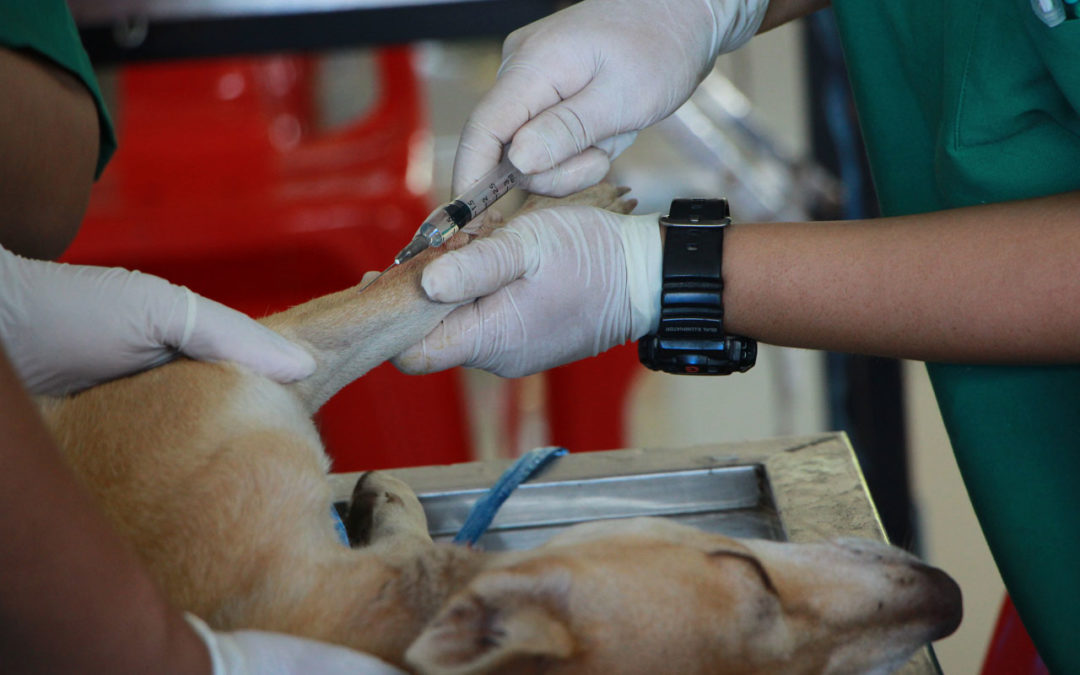If you’ve got a strong stomach, do a quick Google image search of heartworm infestation. Gross! Heartworms can make your pet really miserable and even lead to death. Fortunately, prevention is easy and affordable.
 How are heartworms transmitted?
How are heartworms transmitted?
Heartworms are spread only by infected mosquitoes. There is no way to tell if a mosquito is infected. Due to irrigation and building as well as the migration and transport of infected animals from state to state; all 50 states have reported heartworm positive pets, including those states previously thought to be low-risk. Adult female heartworms living in an infected dog, fox, coyote, or wolf produce microscopic baby worms called microfilaria that circulate in the bloodstream. When a mosquito bites and takes a blood meal from an infected animal, it picks up these baby worms. Then, when the infected mosquito bites another dog, cat, or susceptible wild animal, the larvae enter the new host through the mosquito’s bite wound.
How long do heartworms live?
Once inside a new host, it takes approximately 6 months for the larvae to mature into adult heartworms. An adult heartworm can grow to be a foot long and an infected dog can be host to hundreds of adult worms, although the average burden is 16. Once mature, heartworms can live for 5 to 7 years in dogs and up to 2 or 3 years in cats.
How do heartworms affect my pet?
Since heartworms and their offspring travel through the bloodstream, they can travel to your pet’s vital organs doing permanent damage. Adult heartworms can cause inflammation of the blood vessels and obstruct blood flow leading to kidney and heart failure. Signs your dog may have heartworms are a persistent cough, fatigue during moderate activity, reluctance to exercise, reduced appetite and weight loss. Dogs living with heartworm disease are most likely moderately to extremely uncomfortable. Cats are what is known as an a-typical host for heartworms meaning their physiology makes them a less than ideal host. Heartworms don’t generally mature to adulthood in cats. They can still become infected and testing is more difficult since the test we use for dogs only detects adult heartworms. Often, we don’t know a cat has been infected until it’s too late. Signs can be a persistent cough, adema and fainting.
 What if my pet gets heartworms?
What if my pet gets heartworms?
If your dog’s annual heartworm test comes back positive, the veterinarian will want to confirm the diagnosis with what is called an antigen test. Once a diagnosis is confirmed, it may become necessary to provide additional treatments to stabilize your pet before undergoing heartworm treatment. While your pet is being treated their activity must be restricted. Your veterinarian will administer a series of injections over a period of several weeks or months depending on the severity of the disease. Approximately 6 months following the final treatment, your dog will need to be tested to ensure all the heartworms have been eliminated. Heartworm prevention should be started right away to ensure your pet does not become reinfected.
An ounce of prevention
Treating heartworms is a lengthy and expensive process and worst of all; it can be really traumatic for our pets. Prevention is very affordable and convenient, just Think 12. Heartworm testing every 12 months and prevention 12 months of the year. Our practice has chosen Interceptor Plus and ProHeart for heartworm prevention. There are a number of products on the market but they are only available by prescription so it’s important to discuss with your veterinarian which product is right for your pet. The added benefit of many heartworm preventatives is they also prevent some intestinal parasites, which can be zoonotic (contagious to other species, including humans). It’s also important to purchase your pet’s preventatives from your veterinarian. Your veterinarian carries genuine products that are backed by the manufacturer’s guarantee. Should your pet get heartworms, the manufacturer will pay for the cost of your pet’s treatment. Adverse reactions to these medications are rare, but if it does happen, the manufacturer’s guarantee will cover the cost of the product as well as any treatment your pet required as a result. Heartworm prevention is very effective however; it’s not perfect and a number of factors can contribute to failure. This is why both the American Heartworm Society and your veterinarian will want to make sure your pet has a heartworm test every year.
Your pet is counting on you to keep them safe from heartworms. If it’s been more than a year since your dog’s last heartworm test, click on the “Appointment” tab to request an appointment today. You can request a refill of your dog’s heartworm prevention any time on the Pet Desk app. Then enjoy the outdoors with your best furry friend!

